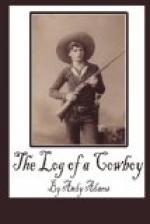“My father reached the house in good time for the funeral services, but when the procession started for the burial ground, the horse was somewhat restless and impatient from the cold. There was quite a string of wagons and other vehicles from the immediate neighborhood which had braved the mud, and the line was nearly half a mile in length between the house and the graveyard. There were also possibly a hundred men on horseback bringing up the rear of the procession; and the chestnut, not understanding the solemnity of the occasion, was right on his mettle. Surrounded as he was by other horses, he kept his weather eye open for a race, for in coming home from dances and picnics with my brothers, he had often been tried in short dashes of half a mile or so. In order to get him out of the crowd of horses, my father dropped back with another pioneer to the extreme rear of the funeral line.
“When the procession was nearing the cemetery, a number of horsemen, who were late, galloped up in the rear. The chestnut, supposing a race was on, took the bit in his teeth and tore down past the procession as though it was a free-for-all Texas sweepstakes, the old man’s white beard whipping the breeze in his endeavor to hold in the horse. Nor did he check him until the head of the procession had been passed. When my father returned home that night, there was a family round-up, for he was smoking under the collar. Of course, my brothers denied having ever run the horse, and my mother took their part; but the old gent knew a thing or two about horses, and shortly afterwards he got even with his boys by selling the chestnut, which broke their hearts properly.”
The elder of the two placer miners, a long-whiskered, pock-marked man, arose, and after walking out from the fire some distance returned and called our attention to signs in the sky, which he assured us were a sure indication of a change in the weather. But we were more anxious that he should talk about something else, for we were in the habit of taking the weather just as it came. When neither one showed any disposition to talk, Flood said to them,—
“It’s bedtime with us, and one of you can sleep with me, while I ’ve fixed up an extra bed for the other. I generally get out about daybreak, but if that’s too early for you, don’t let my getting up disturb you. And you fourth guard men, let the cattle off the bed ground on a due westerly course and point them up the divide. Now get to bed, everybody, for we want to make a big drive tomorrow.”
CHAPTER XXIII
DELIVERY




